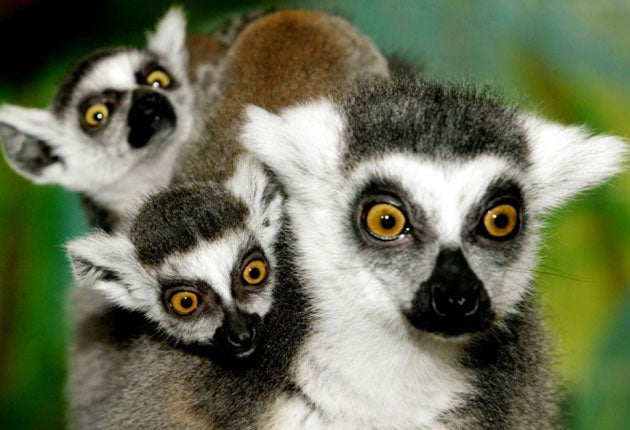Climate change: Lemurs and giant tortoises among species facing extinction if global warming reaches 3C
Wildlife unique to world’s tropical islands and mountains could be wiped out without evasive action
Wildlife species unique to the world’s tropical islands and mountains face extinction if the Earth’s temperature rises 3C above pre-industrial levels, a new research paper warns.
Exotic creatures like Galapagos giant tortoises, lemurs, Himalayan snow leopards and blue cranes will struggle to survive if the planet continues on its present trajectory and the mercury is allowed to climb to that level, as it is currently forecast to do by 2100, the study published in Biological Conservation suggests.
Such a degree of heating is expected to lead to sea level rises from the melting of the polar ice caps and extreme weather occurrences, while ongoing pollution and mineral extraction activities provide further difficulties for endangered species fighting to retain their natural habitats.
The Paris climate accord, recently rejoined by the US, seeks to rein in the extent of global heating to 1.5C and would have a significant impact on averting such tragic extinctions if it could be realised, placing just 2 per cent of land-based animals at risk, compared to 20 per cent at 3C, according to the study.
But without world governments coming together to achieve that goal, nearly half of endemic marine species and 84 per cent of native mountain species would find themselves fighting a losing battle to survive say the researchers, who studied 270 locations around the world known for their high biodiversity and looked at 8,000 projections of possible outcomes.
Islands in the Indian Ocean and Caribbean as well as Madagascar, the Philippines and Sri Lanka could all begin to see an impact on their endemic plant life within the next 30 years as things stand, the authors warn.

Species that have traditionally thrived in such distinctive environments are more likely to be impacted by climate change because they are likely to be less able to adapt to changing conditions, with island-dwelling creatures effectively left stranded and unable to escape to cooler climes.
“We would expect to have cascade effects that might change whole environments, and in the end, harm humankind through weakening of that services that biodiversity brings us,” one of the paper’s authors, Dr Mariana Val of the Federal University of Rio de Janeiro, told The Guardian.
“If climate change remains unchecked, these endemic species will be lost forever.
“It would make a whole lot of difference to biodiversity worldwide if we could keep and reach the Paris agreement. It’s not a small difference, it’s a world of difference.”

Around one million species are currently at risk of extinction around the world, many within a matter of decades, according to the UN.
Species already under threat from the negative impact of human industry have also been hard-hit during the coronavirus pandemic by unavoidable disruption to conservation efforts and cuts to funding.
It is hoped the new report will provided a timely reminder to the public of the plight faced by some of the most beautiful creatures on the planet after another recent study revealed a lack of awareness about the extent of the threat posed by extinction.
Join our commenting forum
Join thought-provoking conversations, follow other Independent readers and see their replies
Comments
Bookmark popover
Removed from bookmarks